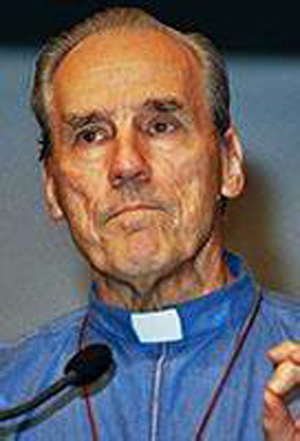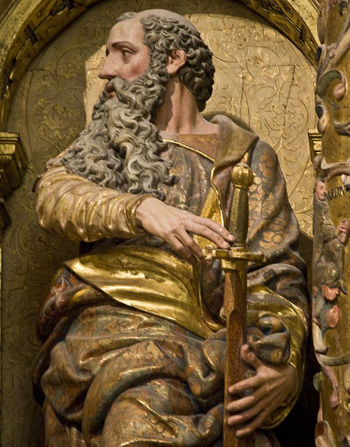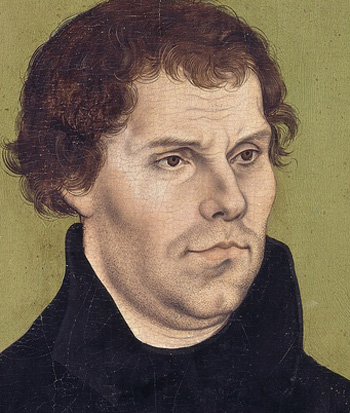Consequences of Vatican II
 |
 |
 |
 |
 |
 |
 |
Protestants Can Receive Communion at Mass,
Says Catholic Theologian
David Knight describes himself as “a senior priest of the Catholic Diocese of Memphis and the leader of a movement for spiritual growth based on the five mysteries of Baptism.” A former Jesuit, he has a doctorate in theology, 50 years of ministerial experience in 19 countries, and 40 books in print. He speaks four languages.
Today Fr. Knight is instructing the many Catholics he influences that it is not against Catholic doctrine for Protestants to receive Communion at Mass. This he affirms with typical Jesuitical aplomb, assurance and "logic," shrewdly including Pope St. Pius X in his argument.
 In one sophistic argument, he affirms that Baptism in the Protestant Churches gives exactly the same thing Baptism in the Catholic Church gives – the “state of grace.”
In one sophistic argument, he affirms that Baptism in the Protestant Churches gives exactly the same thing Baptism in the Catholic Church gives – the “state of grace.”
Now, St. Pius X wrote in his Eucharistic decree, December 20, 1905: “No one who is in the state of grace and comes to the table of the Lord with a good attitude and devotion can be prohibited from receiving Communion.”
Therefore, Fr. Knight smugly concludes, any baptized "Christian" who is in the state of grace is permitted by Catholic doctrine to receive Communion.
He has many other arguments and sophisms, easily assembled by quoting encyclicals and texts of Vatican II, John Paul II and other conciliar Popes, all of which promote a new type of “communion” among men that does not demand acceptance of Catholic dogma.
He even has a simple answer for those who object that Protestants don't believe in the Real Presence of Jesus in the Eucharist. Based on our knowledge of “the mystery of faith and grace” as Catholics, we can say – “without arrogance” – that they really do believe in the Real Presence. They just don't know they do.
In fact, the arrogance of Fr. Knight is staggering.
Contradicts the true teaching of the Church
All can appear ingenious and true to the ears of the modern Catholic unschooled in dogma, suspicious of absolute truth, and completely open to the basic error behind ecumenism that all religions are equal.
But, in fact, the theses of Fr. Knight's new religion directly contradict the age-old teaching of the Catholic Church that one must be a baptized Catholic and believe that the Holy Eucharist is the Body and Blood, Soul and Divinity of Our Lord Jesus Christ in order to receive Communion.
The word communion (from the Latin con = with, unio = union) expresses the unity of the Catholic who receives the Eucharist with all Catholics around the world and at all times who believe the same doctrines, obey the same laws, and follow the Roman Pontiff.
This is why Catholics have a strict law that only people who are in communion with the Church can receive Holy Communion. In other words, only those who are united in the same beliefs – the immutable doctrine of the Catholic Church, the authority of the Pope and the Seven Sacraments – are allowed to receive Holy Communion.
 Receiving Holy Communion is an extremely serious and most sacred action. Even a Catholic must approach the Communion rail without any known unconfessed mortal sin on his soul in order to receive the Eucharist worthily. To receive It unworthily is to incur the guilt of sacrilege.
Receiving Holy Communion is an extremely serious and most sacred action. Even a Catholic must approach the Communion rail without any known unconfessed mortal sin on his soul in order to receive the Eucharist worthily. To receive It unworthily is to incur the guilt of sacrilege.
Scripture itself is clear about the consequences: “Wherefore whosoever shall eat this bread, or drink the chalice of the Lord unworthily, shall be guilty of the body and of the blood of the Lord . ...For he that eateth and drinketh unworthily, eateth and drinketh judgment to himself, not discerning the body of the Lord.” (1 Cor 11 27: 29) That is, his sin is the same as if he had put Our Lord to death.
This is the age-old uncompromised teaching of the Church.
The novel teaching of Fr. Knight is to heap up guilt on the soul of the unworthy receiver and the one who give him Communion in the name of the false conception of communion that has been promoted since Vatican II.
A different meaning of Communion
Fr. Knight believes that the “old policy” of receiving Communion focuses too much on “the divisive historical event of the Protestant Reformation and on the sociologically observable differences in doctrine and discipline that make our communion with each other imperfect.”
It is a negative approach, he complains, too concerned about differences rather that “the real communion we actually do have by affirming together what we do have in common.” And, according to him, since this is “almost” everything, that is good enough.
But there is no “real communion” without perfect communion.
How did these unorthodox view become entrenched so deeply into the post-Vatican II Church?
 Atila Guimarães explains it well in Animus Delend II, the fifth volume of his
Collection on Vatican II. The new “communion” promoted by progressivists since Vatican II seeks to set aside doctrinal disagreements separating the different religions. No more heavy doctrinal debates, no more nasty disagreements. We can all join together in communion around the points we agree on. (Cf. Animus Delendi II, part 2, chap. 5 nn. 6-37)
Atila Guimarães explains it well in Animus Delend II, the fifth volume of his
Collection on Vatican II. The new “communion” promoted by progressivists since Vatican II seeks to set aside doctrinal disagreements separating the different religions. No more heavy doctrinal debates, no more nasty disagreements. We can all join together in communion around the points we agree on. (Cf. Animus Delendi II, part 2, chap. 5 nn. 6-37)
From praying together with Protestants to joint efforts on peace or the war of poverty, we have thus progressed to receiving Communion together at “the table.” It is not such a far stretch to go once you have left the road of the Church Militant and entered the way of the Church Tolerant.
Some Catholics I know will immediately object that Fr. Knight's bold call for Protestants to receive Communion is not a consequence of Vatican II, but another brazen initiative inspired by Francis.
I will let Fr. Knight answer that objection. To uphold his position, he reminds us, “John Paul II gave communion in the Vatican to Tony Blair, Prime Minister of England, while he was still an Anglican. At John Paul's funeral, Pope Benedict XVI gave Communion to Brother Roger, the Presbyterian founder of the ecumenical monastery of Taizè. That should be enough to settle the question."
I agree on that one point of Fr. Knight's at least – that this “settles the question.” The matter it settles is that the post-Vatican II Popes have all had the constant and consistent aim to accelerate the union of religions independent of doctrinal questions.
The way evil advances
Little by little the external differences between the Catholic Church and Protestant Sects are disappearing as everything blends into a pan-Religion. This process is one that has softened the fiber in Catholics and weakened their sense of good and evil. It makes resistance difficult for them because they no longer see what is right and wrong in anything.
A kind of ecumenism by osmosis takes place in the souls of Catholics, making them insensible to the fact that there is only one true Church. This process took place gradually at first, but has increased to the torrent we see today.
The result of this process is that multitudes of Catholics have lost their old faith, forgotten their old enthusiasm for knowing and defending the truth, left off their old penances and sacrosanct austerities of times past. Doctrine, always firm and unchanging, has become liquid and spongy. This is the way evil advances today.

Today Fr. Knight is instructing the many Catholics he influences that it is not against Catholic doctrine for Protestants to receive Communion at Mass. This he affirms with typical Jesuitical aplomb, assurance and "logic," shrewdly including Pope St. Pius X in his argument.

Fr. Knight: Protestants can receive Communion in a Catholic Mass
Now, St. Pius X wrote in his Eucharistic decree, December 20, 1905: “No one who is in the state of grace and comes to the table of the Lord with a good attitude and devotion can be prohibited from receiving Communion.”
Therefore, Fr. Knight smugly concludes, any baptized "Christian" who is in the state of grace is permitted by Catholic doctrine to receive Communion.
He has many other arguments and sophisms, easily assembled by quoting encyclicals and texts of Vatican II, John Paul II and other conciliar Popes, all of which promote a new type of “communion” among men that does not demand acceptance of Catholic dogma.
He even has a simple answer for those who object that Protestants don't believe in the Real Presence of Jesus in the Eucharist. Based on our knowledge of “the mystery of faith and grace” as Catholics, we can say – “without arrogance” – that they really do believe in the Real Presence. They just don't know they do.
In fact, the arrogance of Fr. Knight is staggering.
Contradicts the true teaching of the Church
All can appear ingenious and true to the ears of the modern Catholic unschooled in dogma, suspicious of absolute truth, and completely open to the basic error behind ecumenism that all religions are equal.
But, in fact, the theses of Fr. Knight's new religion directly contradict the age-old teaching of the Catholic Church that one must be a baptized Catholic and believe that the Holy Eucharist is the Body and Blood, Soul and Divinity of Our Lord Jesus Christ in order to receive Communion.
The word communion (from the Latin con = with, unio = union) expresses the unity of the Catholic who receives the Eucharist with all Catholics around the world and at all times who believe the same doctrines, obey the same laws, and follow the Roman Pontiff.
This is why Catholics have a strict law that only people who are in communion with the Church can receive Holy Communion. In other words, only those who are united in the same beliefs – the immutable doctrine of the Catholic Church, the authority of the Pope and the Seven Sacraments – are allowed to receive Holy Communion.

St. Paul: It is a crime to receive the Communion unworthily
Scripture itself is clear about the consequences: “Wherefore whosoever shall eat this bread, or drink the chalice of the Lord unworthily, shall be guilty of the body and of the blood of the Lord . ...For he that eateth and drinketh unworthily, eateth and drinketh judgment to himself, not discerning the body of the Lord.” (1 Cor 11 27: 29) That is, his sin is the same as if he had put Our Lord to death.
This is the age-old uncompromised teaching of the Church.
The novel teaching of Fr. Knight is to heap up guilt on the soul of the unworthy receiver and the one who give him Communion in the name of the false conception of communion that has been promoted since Vatican II.
A different meaning of Communion
Fr. Knight believes that the “old policy” of receiving Communion focuses too much on “the divisive historical event of the Protestant Reformation and on the sociologically observable differences in doctrine and discipline that make our communion with each other imperfect.”
It is a negative approach, he complains, too concerned about differences rather that “the real communion we actually do have by affirming together what we do have in common.” And, according to him, since this is “almost” everything, that is good enough.
But there is no “real communion” without perfect communion.
How did these unorthodox view become entrenched so deeply into the post-Vatican II Church?

Luther & the Protestants do not believe in the Real Presence of Our Lord in the Eucharist
From praying together with Protestants to joint efforts on peace or the war of poverty, we have thus progressed to receiving Communion together at “the table.” It is not such a far stretch to go once you have left the road of the Church Militant and entered the way of the Church Tolerant.
Some Catholics I know will immediately object that Fr. Knight's bold call for Protestants to receive Communion is not a consequence of Vatican II, but another brazen initiative inspired by Francis.
I will let Fr. Knight answer that objection. To uphold his position, he reminds us, “John Paul II gave communion in the Vatican to Tony Blair, Prime Minister of England, while he was still an Anglican. At John Paul's funeral, Pope Benedict XVI gave Communion to Brother Roger, the Presbyterian founder of the ecumenical monastery of Taizè. That should be enough to settle the question."
I agree on that one point of Fr. Knight's at least – that this “settles the question.” The matter it settles is that the post-Vatican II Popes have all had the constant and consistent aim to accelerate the union of religions independent of doctrinal questions.
The way evil advances
Little by little the external differences between the Catholic Church and Protestant Sects are disappearing as everything blends into a pan-Religion. This process is one that has softened the fiber in Catholics and weakened their sense of good and evil. It makes resistance difficult for them because they no longer see what is right and wrong in anything.
A kind of ecumenism by osmosis takes place in the souls of Catholics, making them insensible to the fact that there is only one true Church. This process took place gradually at first, but has increased to the torrent we see today.
The result of this process is that multitudes of Catholics have lost their old faith, forgotten their old enthusiasm for knowing and defending the truth, left off their old penances and sacrosanct austerities of times past. Doctrine, always firm and unchanging, has become liquid and spongy. This is the way evil advances today.

Posted July 29, 2020
______________________
______________________
 Volume I |
 Volume II |
 Volume III |
 Volume IV |
 Volume V |
 Volume VI |
 Volume VII |
 Volume VIII |
 Volume IX |
 Volume X |
 Volume XI |
 Special Edition |


